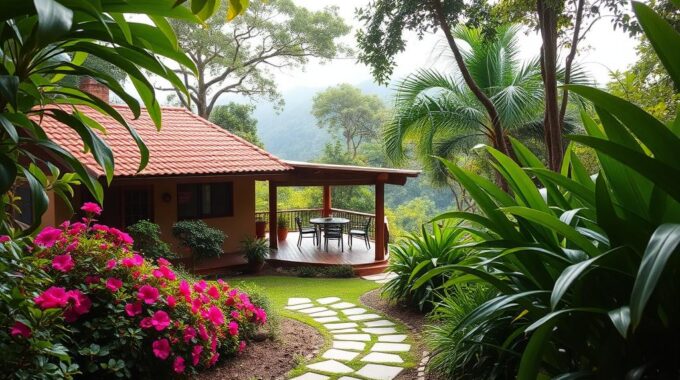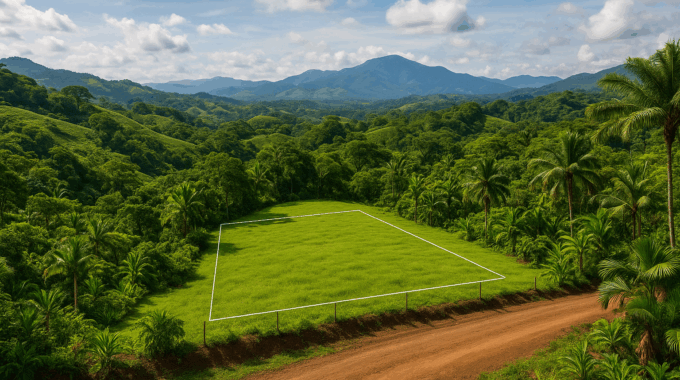"Property Renovations? Fund It With an Equity Loan from GAP Equity Loans. Borrow $50,000 to $1,000,000 with interest rates starting at 12% and flexible loan terms."

Discover the Benefits of a Home Equity Loan in Costa Rica
For those envisioning a slice of Costa Rican paradise as their own, questions regarding financing options, mortgage accessibility, and investment viability are paramount.
Financing real estate in Costa Rica offers a variety of options, each with its own advantages and considerations. Home equity loans represent one of the most accessible financing options for property owners, allowing individuals to leverage the value of their existing property to secure funds.
We connect borrowers with private investors and lenders, providing competitive interest rates, lower fees, and flexible financing options compared to traditional banks. Whether you’re looking to renovate your existing property, purchase additional real estate, or need funds for other investments, understanding home equity loan options in Costa Rica is essential for making informed financial decisions.
Understanding Home Equity Loans in Costa Rica
Understanding how home equity loans work is crucial for property owners in Costa Rica who are looking to secure financing. We aim to simplify this process, helping hardworking individuals achieve their investment property goals without unnecessary hurdles.
What is a Home Equity Loan?
A home equity loan is a financial product that allows property owners to borrow against the equity they’ve built in their real estate, with the property serving as collateral for the loan. The equity in a property is calculated by subtracting any existing mortgages or liens from the current market value of the property.
- A home equity loan, or HELOC, is collateralized by your home, allowing you to borrow up to 65-75% of your home’s value.
- For example, on a $300,000 home with a $100,000 remaining mortgage balance, you could potentially borrow between $195,000 to $225,000.

How Home Equity Loans Work in Costa Rica
In Costa Rica, home equity loans operate differently than in North America and are often provided through private lenders rather than traditional banking institutions. These loans focus primarily on the property’s value rather than the borrower’s credit history or income, making them more accessible to foreigners.
For more information on making the most of your home equity, you can visit GAP Equity Loans to learn how to leverage your property’s value for financing.
The Challenges of Traditional Financing in Costa Rica
Securing a traditional mortgage in Costa Rica can be a daunting process for foreigners. Unlike in their home countries, Costa Rican banks face challenges in assessing the creditworthiness of non-residents due to limited access to their financial records.
Banking Limitations for Foreigners
Costa Rican banks have stringent requirements for foreign buyers, including extensive documentation that can be overwhelming and time-consuming. The lack of access to foreign credit histories and financial records complicates the assessment of creditworthiness.
- Traditional financing through Costa Rican banks presents numerous obstacles for foreign buyers.
- Costa Rican banks often lack access to foreign credit histories, which makes it challenging to assess creditworthiness accurately.
- The language barrier adds complexity to the mortgage application process.
Why Traditional Mortgages Are Difficult to Obtain
Qualifying for a traditional mortgage typically requires permanent residency status, which many property buyers don’t have. Even when foreigners qualify, interest rates are typically 3-5% higher than comparable loans in North America, with high closing costs.
- Permanent residency status is often required for traditional mortgage qualification.
- Higher interest rates and closing costs are associated with traditional bank financing for foreigners.
- Costa Rica’s conservative lending practices create barriers for foreign property buyers.
Key Benefits of a Home Equity Loan in Costa Rica

Home equity loans in Costa Rica offer numerous benefits for property owners seeking to leverage their assets. We simplify the process, helping hardworking individuals secure the financing needed to achieve their investment property goals without unnecessary hurdles.
Easier Qualification Process
One of the primary advantages of home equity loans in Costa Rica is the streamlined qualification process. Unlike traditional banks, our qualification criteria focus primarily on the property’s value rather than complex documentation. Foreign property owners benefit from qualification criteria that don’t depend on Costa Rican residency status or local credit history, removing major barriers that exist with traditional financing.
Using Your Property as Collateral
Using your property as collateral provides lenders with security, allowing them to offer financing even when traditional banks would decline based on residency status or income verification challenges. The collateral-based approach places less emphasis on income verification and credit history, instead focusing on the property’s market value and condition.
Access to Significant Funds
Property owners can access significant funds—typically up to 65-75% of their property’s value minus any existing mortgages—providing substantial capital for investments, renovations, or other financial needs. These loans can be processed much faster than traditional mortgages, often closing in weeks rather than the months required for conventional bank financing.
For investment property owners, home equity loans provide quick access to capital that can be used for additional property purchases, renovations to increase rental income, or other business opportunities. The flexibility of these loans allows borrowers to use funds for virtually any purpose, unlike specific-purpose loans that restrict how the money can be used.
Financial Advantages of Costa Rican Home Equity Loans
For those looking to leverage their property in Costa Rica, home equity loans present several key financial advantages. We connect borrowers with private investors and lenders, offering competitive rates, lower fees, and flexible financing options that surpass those of traditional banks.
Competitive Interest Rates
One of the primary financial benefits of home equity loans in Costa Rica is the competitive interest rates they offer. Private banks offering financing to foreigners typically have interest rates ranging from 8.5% to 10%, while private lenders may provide funding with interest rates varying between 8% and 16%. Seller financing typically comes with interest rates ranging from 6% to 9%. These rates are often more favorable than those offered by traditional banks, particularly for foreign individuals.

Lower Fees Compared to Traditional Banks
The fee structure for home equity loans is typically more straightforward and lower than traditional bank financing. Traditional bank financing in Costa Rica often comes with closing costs as high as 3% of the loan amount, while home equity loans generally have more reasonable closing costs. This reduction in fees can result in significant savings for borrowers.
Flexible Repayment Options
Flexible repayment options are a significant advantage of home equity loans. Borrowers can often choose between interest-only payments with a balloon payment at the end of the term, or fully amortized payments that include both principal and interest. Some lenders offer early repayment options without penalties, providing borrowers with the flexibility to pay off their loans ahead of schedule if their financial situation improves.
How to Qualify for a Home Equity Loan in Costa Rica
Costa Rica’s home equity loan market offers flexible qualification criteria, focusing on property value rather than personal financial history. This approach simplifies the process, making it more accessible to a wider range of borrowers.
Property Requirements
To qualify for a home equity loan, your property must meet specific criteria. Typically, properties should be fully titled, not on concession land, and have clear ownership without legal disputes. Most lenders prefer residential or commercial real estate with an established market value; however, undeveloped land may be considered, albeit with additional restrictions or higher interest rates.
Documentation Needed
The documentation required for a home equity loan is significantly streamlined compared to traditional bank financing. You’ll typically need to provide property title documents, recent property tax receipts, identification documents, and sometimes basic income verification. The property will also need to be professionally appraised by an evaluator accepted by the lender, with the appraisal cost typically paid by the borrower.
For more detailed insights on home equity loans in Costa Rica, you can visit our page on Costa Rica Home Equity Loan Insights. We work to simplify this process further by connecting borrowers with lenders whose requirements match their specific property and financial situation.
GAP Equity Loans: A Financing Solution in Costa Rica
With GAP Equity Loans, Costa Rican property owners have a new avenue for securing funds. GAP Equity Loans specializes in providing financing solutions specifically designed for property owners in Costa Rica, offering a streamlined alternative to traditional bank financing.
Loan Terms and Amounts
GAP Equity Loans offers loan amounts ranging from $50,000 to $1,000,000, making this financing option suitable for various needs, from smaller renovations to major investments or property acquisitions. The loan terms are flexible but typically range from 6 months to 3 years.
Interest Rates and Conditions
Interest rates start at 12% and vary primarily based on the loan-to-value ratio (LTV), with lower LTV ratios typically qualifying for more favorable rates. Other factors that affect interest rates include property location, condition, marketability, and occasionally the borrower’s financial profile.
Application Process
The application process is designed to be straightforward and efficient, focusing on property documentation rather than extensive personal financial history. Borrowers begin by submitting basic property information and their financing needs, followed by a preliminary assessment to determine eligibility.
Once preliminary approval is granted, a professional appraisal is arranged to establish the property’s current market value and condition. After appraisal, final loan terms are presented based on the property’s value and the requested loan amount, with closing typically occurring within weeks rather than months.
Conclusion: Making the Most of Your Costa Rican Property Investment
As we navigate the complexities of investing in Costa Rica’s real estate market, home equity loans emerge as a vital financial tool. For property owners, these loans offer a means to leverage their assets, accessing capital for renovations, additional investments, or other financial needs without the hurdles of traditional bank financing.
The flexibility of equity loans makes them suitable for various investment strategies, from short-term property flips to long-term rental income generation. By working with lenders who specialize in the Costa Rican market, such as GAP Equity Loans, property owners can secure financing that recognizes the value of their investment.
Whether you’re a seasoned investor or a newcomer to Costa Rica’s real estate market, understanding how to maximize your property’s value through strategic financing is essential. With the right financing options, you can maximize your investment’s potential, capitalizing on Costa Rica’s thriving property market.
Article by Glenn Tellier (Founder of CRIE and Grupo Gap)



